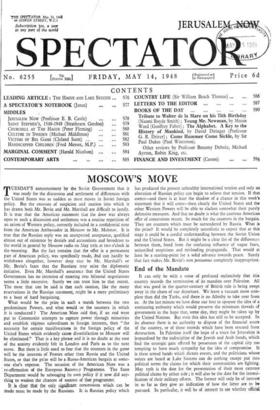MOSCOW'S MOVE
TUESDAY'S announcement by the Soviet Government that it was ready for the discussion and settlement of differences with the United States was as sudden as most moves in Soviet foreign policy. But the excesses of suspicion and caution into which it has drawn both Mr. Bevin and Mr. Marshall are difficult to justify. It is true that the American statement that the door was always open to such a discussion and settlement was a routine repetition of an axiom of Western policy, correctly included in a confidential note from the American Ambassador in Moscow to Mr. Molotov. It is true that the Russian reply was an unexpected acceptance, qualified almost out of existence by denials and accusations and broadcast to the world in general by Moscow radio on May Itth at two o'clock in the 'morning. But the fact remains that the offer is a permanent part of American policy, was specifically made, And can hardly be withdrawn altogether, however deep may be Mr. Marshall's or Mr. Bevin's fears that the Russians may seize the diplomatic initiative. Even Mr. Marshall's assurance that the United States Government has no intention of entering into bilateral negotiations seems a little excessive. Surely we can trust him to that extent. The most that can be said is that such caution, like the many reservations in the Russian statement, might be a mere preliminary to a bout of hard bargaining.
What would be the prize in such a match between the two predominant Powers, and what would OC the counters in which it is conducted ? The American Note said that, if an end were put to Communist attempts to capture power through minorities and establish regimes subordinate to foreign interests, then " the necessity for certain manifestations in the foreign policy of the United States which evidently cause dissatisfaction to Moscow will be eliminated." That is a key phrase and it is no doubt at the root of the anxiety evidently felt in London and Paris as to the next move. But there is little need to fear that the counters in the game will be the interests of Powers other than Russia and the United States, or that the prize will be a Russo-American bargain at some- one else's expense. The occasion of the American Note was a re-affirmation of the European Recovery Programme. The State Department would be sabotaging its own policy if it now did any- thing to weaken the chances of success of that programme. It is clear that the only significant concessions which can be made must be made by the Russians. It is Russian policy which has produced the present unhealthy international tension and only an alteration of Russian policy can begin to relieve that tension. If that comes—and there is at least the shadow of a chance in this week's statement that it will come—then clearly the United States and the other Western Powers will be able to slacken somewhat their purely defensive measures. And that no doubt is what the cautious American offer of concessions meant. So much for the counters in the bargain. They are counters which must be surrendered by Russia. What is the prize? It would be completely unrealistic to expect that at this stage it could be a cordial understanding between the Soviet Union and the United States. But it might be a clear list of the differences between them, freed from the confusing influence of vague fears, unjustified suspicions and misleading propaganda. That would at least be a starting-point for a solid advance towards peace. Surely that fact makes Mr. Bevin's non possumus completely inappropriate.






























